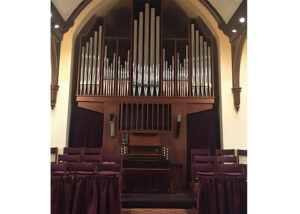Based on my first-hand experience with the Mennonite church in Canada and the U.S. over the past 18 years, I suspect that far less than 10 percent of primarily white Mennonite congregations are genuinely interested in embracing or pursuing a truly intercultural church.
Of Canadians who identify as Christian, 20 percent are immigrants, up from 17 percent in 2011 (according to Stats Canada). This shows that visible minorities are emerging within Canadian churches. Meanwhile white-dominant Mennonite churches remain largely culturally “cubicled.”
The 2021 national census revealed more than 450 ethnic or cultural origins reported in Canada. Only a minimal fraction of these are represented in Mennonite churches. This reality calls the church to be more ethnically diversified. We have a long way to go.
However, what surprises me is not only the small number of Mennonite churches contributing to interculturalization, but the superficial level of intercultural awareness among churches. Too many of them see the intercultural church as a checklist of how many ethnic groups or leaders are present under the same roof: “We have a Korean group, the Chin group, the Congolese group, etc.”
Of course, these churches acknowledge and cherish these groups as an invaluable resource and impetus to enrich their European-centred thinking, but sometimes it feels to me like, at the same time, they are ensuring that the ethnic influence not outweigh their traditional Mennonite way of running the church.
Many years ago these ethnic groups would have entered a white-dominant Mennonite church and unhesitatingly said: “We want to become part of your congregation. How can we become Mennonites?” Willingly or unwillingly, the congregation would then have become more intercultural. For the sake of unity, they would have gathered and worshipped together at least once a month and probably followed up with an international banquet, no matter how spicy or mild the food. All people would have quite possibly seemed satisfied by this intermittent and controlled intercultural interaction.
The problem is that the relationship of host and guest would have remained unchanged. Even today, a wall still exists, invisible and seemingly insurmountable at times, that separates “original” Mennonites—whose origins are, as a matter of fact, untraceably blurred—and new Mennonites.
Sometimes it feels like groups merely tolerate each other, a sort of tentative contract by which they try not to make each other uncomfortable, but are ready to depart as soon as the unwritten contract is breached. It is nothing other than good-willed superficiality.
It is difficult for me not to feel frustration. The other side of the frustration is that I long for deep, authentic intercultural connection within the family of God, old and new.
Being a truly intercultural church takes work—strenuous and intentional work. Nothing is earned for free. It requires costly sacrifice. The words in John 12:24 fit: “Unless a grain of wheat falls into the earth and dies, it remains just a single grain; but if it dies, it bears much fruit.” If we believe we are a grain or a seed of the intercultural church, we should be ready to die.
But what does it mean for us to die?
In some cases, it means giving up certain Mennonite traditions, such as always singing in four-part harmony or an obsession with the tidiness of church buildings. Such sacrifices may be required for the expanded unity and inclusion of new people. Likewise, from the perspective of incoming and new congregants, it could also mean giving up on certain cultural or ethnic preferences.
What is more, each individual’s strong cultural identity should be ready to be bent, without being broken, in order for a bigger, new identity to be born. We need to learn from Paul’s versatility in becoming all things to all people so that by all possible means we might save some (I Corinthians 9:22). In Christ, Paul was given various situations so that he could sacrifice his own privileges as a traditional Pharisee and Roman citizen in order to bring new people to the light of Christ.
The Bible, especially in Paul’s epistles, exhorts us to build a truly intercultural church in practical ways. For this, we do not need to look up fancy programs outside the church or bring in any church planters or church growth experts; we need to go back to the basics of the Bible, and resume and rekindle the spirit of togetherness or “one anotherness.” This spirit is innate, born out of our inseparable connection with our Lord Jesus Christ. By that spirit, we can go beyond our human tendency to be fractured and disconnected. We can go beyond a shallow and superficial understanding of intercultural church that sees it simply as a “good thing.”
In the New Testament alone there are 339 occurrences of “one another,” highlighting the importance of belonging or connecting to one another in shared life. I gained this insight from Bruderhof pastor and writer Charles Moore’s essay, “It Takes Work,” which appears in the book Called to Community: The Life Jesus Wants For His People.
Here are some examples of “one anotherness” in the New Testament:
- Honour one another above yourselves (Romans 12:10)
- Build up one another (Romans 14:19; I Thessalonians 5:11)
- Accept one another (Romans 15:7)
- Care for one another (I Corinthians 12:25)
- Wait for one another (I Corinthians 11:33)
- Serve one another (Galatians 5:13)
- Bear one another’s burdens (Galatians 6:2)
- Forgive one another (Ephesians 4:2, 32; Colossians 3:13)
- Be patient with one another (Ephesians 4:2; Colossians 3:13)
- Be kind and compassionate to one another (Ephesians 4:32)
- Stir up [provoke, stimulate] one another to love and good works (Hebrews 10:24)
- Pray for one another (James 5:16)
- Confess your faults to one another (James 5:16)
- Be at peace with one another (I Thessalonians 5:15)
- Love one another (John 13:34 and at least 15 other places)
There are also some negative one another commands:
- Do not lie to one another (Colossians 3:9)
- Stop passing judgment on one another (Romans 14:13)
- Let us not become conceited, provoking and envying each other (Galatians 5:26)
- Don’t grumble against each other (James 5:9)
These passages raise the following question: How seriously has our church lived out these biblical mandates for us to become a truly intercultural, interpersonal, interrelational and integrative church?
If we are not ready, willing or committed to share our lives with one another without reserve, then our noble exhortations about diversity are nothing but a noisy gong or a clanging cymbal. If we truly hold intention to become an intercultural church, it will demand much more of us than we naturally assume. It is a life’s task to be shared and understood beyond any cultural and ethnic differences.
Is it too overwhelming to invest your whole lives for the intercultural church? If you think so, it is because you think it is your own job alone to do this.
But you are not alone. Remember: “God is faithful and he will not let you be tempted beyond what you can bear” (I Corinthians 10:13), and he is the foundation on which we are able to work for our church—our intercultural church. As such, we are called according to God’s purpose to work together and to serve one another for his goodness.
Therefore, everything we do must be done in Christ, and placed under his power and authority. Don’t misunderstand our work for church as a human plan or something based in our will; it comes out of Christ’s divine initiative and we are the people who are called to fulfil that initiative. Only through the Spirit of Christ are we capable of living out the “one another” commandments. Only through Christ can a true and sustainable intercultural church be born and flourish.
Again, brothers and sisters, I tell you, building and seeking a truly intercultural church leads us to a radical, revolutionary restructuring of life on all levels. Such a task is never easy. It takes a life’s work to give up our pride, pleasures, preferences, privileges, priorities and patterns, in order to embark on a journey with others who want their lives to be shared and shaped by the joy of the gospel for the one holy, universal community beyond all differences!
Are you ready to explore and embody this uncharted intercultural adventure? It is a journey toward our unsettled one anotherness in Christ, which is sure to expand the boundaries of his kingdom on earth and to advance our solidarity here and now.
Joon Park is interim co-pastor of Holyrood Mennonite Church in Edmonton.
For discussion
1. What are the worship customs in your church? How receptive are people to new styles of singing, prayer, communion or other aspects of worship?
2. Do you think worship is something people prefer to have ritualized so they can feel comfortable and know what to expect?
3. Joon Park talks about the wall between original Mennonites and new Mennonites. In what ways have you experienced this separation?
4. Park mentions four-part singing or an obsession with tidiness as examples of Mennonite traditions that might need to be sacrificed to achieve an intercultural church. Can you think of other cultural preferences that might be hard to let go?
5. What are some of the blessings of being called beyond our cultural norms to an “uncharted, intercultural adventure”?
—By Barb Draper









Leave a Reply
You must be logged in to post a comment.